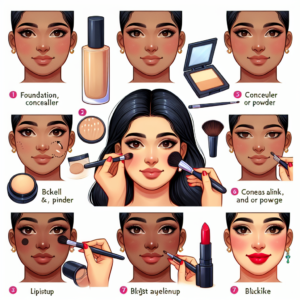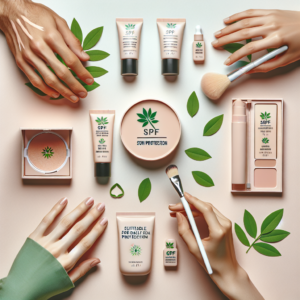
Key Takeaways
- Vegan SPF makeup is ideal for sensitive and oily skin as it avoids animal-derived irritants.
- Hypoallergenic products minimize the risk of allergic reactions and are gentler on the skin.
- Ingredients like zinc oxide and titanium dioxide are commonly found in vegan SPF makeup and provide physical sun protection.
- It’s important to choose non-comedogenic makeup to prevent clogged pores, especially for those with oily skin.
- Regular application and proper removal of makeup are key to maintaining healthy, happy skin.
Challenges of Sensitive & Oily Skin Types
When you have sensitive and oily skin, every new product feels like a gamble. You’re walking a tightrope between managing excess oil and avoiding irritation. I get it – your skin is as demanding as a gourmet chef, but the right vegan SPF makeup can satisfy even the pickiest complexion.
Why vegan, though? Because vegan makeup skips the animal-derived ingredients that often lead to skin drama. And for the oily aspect, you want products that say “non-comedogenic” on the label, which means they won’t clog your pores.
Most importantly, you need to know that sensitive skin is like a delicate ecosystem. It thrives on balance and reacts to the slightest change. So, hypoallergenic makeup, which is formulated to minimize the risk of allergic reactions, becomes your skin’s best friend.
Significance of SPF Protection
Now, let’s talk sun protection. You wouldn’t go out in a rainstorm without an umbrella, right? So why face the sun’s rays unprotected? SPF isn’t just for beach days – it’s your daily shield against the aging and damaging effects of the sun. And yes, even through windows or on cloudy days, those UV rays are sneaky.
For those with oily skin, the fear is real: Will SPF turn me into a greasy mess? The answer is no – not if you choose the right product. Vegan SPF makeup has come a long way, with formulas that protect without the shine.
Selecting the Right Vegan SPF Makeup
So, how do you pick your vegan SPF makeup warrior? It’s all about reading labels and knowing your ingredients. Look for zinc oxide and titanium dioxide – these are mineral sunscreens that sit on top of your skin, forming a barrier against UV rays. They’re less likely to cause irritation than chemical sunscreens, which absorb into the skin.
Ingredients to Look for in Vegan Makeup
Let’s dive into the ingredients list. When you’re scanning the shelves or browsing online, keep your eyes peeled for:
- Zinc Oxide: A mineral sunscreen that offers broad-spectrum protection without irritating the skin.
- Titanium Dioxide: Another mineral sunscreen that works hand-in-hand with zinc oxide to cover your UV bases.
- Aloe Vera: It’s soothing, it’s hydrating, and it’s your skin’s BFF.
- Green Tea Extract: An antioxidant powerhouse that can help manage oily skin and protect against environmental stressors.
And what to avoid? Fragrances and parabens are common culprits of skin irritation. Vegan doesn’t always mean fragrance-free, so double-check that label.
Example: A label reads “zinc oxide 20%, aloe vera, green tea extract, fragrance-free, paraben-free.” This is a green light for your sensitive and oily skin.
Remember, the goal is to protect and pamper your skin, not to overwhelm it. Think of your makeup as a gentle guardian, keeping you safe and shine-free.
What Makes a Product Hypoallergenic?
Hypoallergenic makeup is designed to reduce the risk of allergic reactions. This is especially important for sensitive skin, which can react to a wide range of ingredients. When a product is labeled hypoallergenic, it suggests that it’s been formulated without common allergens, but it’s not a guarantee. Since there’s no regulated standard for this term, it’s still crucial to do a patch test before applying new makeup to your face.
Determining the Proper SPF for Your Skin
When it comes to SPF, higher numbers mean more protection, but how high do you really need to go? For everyday use, an SPF of 30 is typically sufficient, blocking about 97% of UVB rays. If you’re spending more time outdoors, you might want to go higher. Just remember, no SPF can block 100% of UV rays, and reapplication is key, especially if you’re sweating or swimming.
Guide to Vegan Makeup Solutions
Now, let’s talk application. Vegan SPF makeup is not just about slathering it on and hoping for the best. There’s an art to it. The goal is to create a look that’s both protective and flattering, without triggering your sensitive skin or turning your face into an oil slick.
How to Apply SPF Makeup Effectively
First things first: start with clean, moisturized skin. Then, take a pea-sized amount of your vegan SPF makeup and dot it on your forehead, cheeks, and chin. Blend it outwards with a sponge or your fingers, being careful not to tug at the skin. The key is to create an even layer that will act as a shield against the sun.
Tips for a Matte Finish on Oily Skin
If you’re battling oily skin, the last thing you want is added shine. Look for matte-finish products or those labeled “oil-free.” After applying your SPF makeup, set it with a translucent powder. This will help absorb excess oil throughout the day and keep your skin looking fresh.
Maintaining Skin Health with Regular Use
Consistency is your friend when it comes to maintaining skin health. Use your vegan SPF makeup daily, even when it’s cloudy. UV rays can penetrate through clouds and windows, so don’t skip a day. At the same time, ensure you’re removing your makeup thoroughly each night to let your skin breathe and recover.
For example, a daily routine might look like this: apply vegan SPF makeup in the morning, touch up with translucent powder as needed during the day, and use a gentle cleanser to remove everything before bed.
Favorite Picks for Vegan SPF Makeup
With so many options out there, finding the right products can be overwhelming. Let’s narrow it down to some favorites that are kind to both sensitive and oily skin.
Tinted Moisturizers with SPF for Daily Wear
Tinted moisturizers with SPF are a great two-in-one option. They provide light coverage to even out your skin tone while protecting your skin from the sun. Look for formulas that contain hydrating ingredients like hyaluronic acid, which can help balance your skin’s moisture levels without contributing to oiliness.
Finding Full-Coverage Foundations that Care for Your Skin
If you need more coverage, there are full-coverage foundations out there that won’t aggravate your sensitive skin. Choose products that boast a long-wearing, non-cakey formula and are free from irritants like fragrance and alcohol.
And don’t forget about ingredients that can benefit your skin. Niacinamide, for example, can help regulate oil production and soothe inflammation.
Concealers and Powders – Building Your Sensitive Skin Toolkit
Concealers can help cover blemishes and under-eye circles without causing irritation if you pick the right formula. Look for ones that are creamy and blendable, which won’t require you to rub or pull at the skin.
For powders, opt for a finely milled formula that’s designed to set makeup without adding weight or texture. A little goes a long way, so use a light hand.
Setting Your Look without Irritation
After you’ve applied your makeup, it’s crucial to set it in place, especially if your skin tends to get oily. But here’s the thing: you want to lock in your look without causing a flare-up. The trick is to use a setting spray or powder that’s as gentle as it is effective. Choose a setting product that’s free from alcohol and fragrances, as these can be drying and irritating for sensitive skin.
End-of-Day Removal: Keeping Sensitive Skin Happy
As important as it is to apply makeup correctly, it’s equally vital to take it off properly. Your skin needs to breathe and repair itself overnight. Use a gentle, oil-free makeup remover or micellar water designed for sensitive skin. Massage it in softly with your fingertips or a soft cotton pad—no harsh rubbing needed. Follow up with your regular skincare routine to ensure your skin stays hydrated and happy.
And remember, even if you’re tired, never sleep in your makeup. It can lead to clogged pores, breakouts, and irritation. Consider your nightly cleanse as a crucial step in your self-care ritual.
FAQs
Let’s tackle some common questions you might have about vegan SPF makeup for sensitive and oily skin:
How do I know if a makeup product is truly vegan?
To ensure a product is truly vegan, check the ingredients list for animal-derived substances. Also, look for certifications from reputable organizations like PETA or the Vegan Society. These certifications mean the product is free from animal ingredients and, in most cases, also not tested on animals. You can also reach out to the company directly for confirmation.
Can SPF makeup cause breakouts for oily skin?
While some SPF makeup can cause breakouts, particularly if it’s oil-based, many vegan SPF makeup options are formulated to be non-comedogenic and suitable for oily skin. Always look for products labeled “oil-free” or “non-comedogenic” to reduce the risk of clogged pores and breakouts.
How often should I reapply vegan SPF makeup throughout the day?
For continuous protection, reapply your vegan SPF makeup every two hours, especially if you’re outdoors or sweating. If you’re wearing makeup, use a setting powder with SPF to make reapplication easier without disrupting your look.
Are there vegan makeup brands that cater specifically to sensitive and oily skin?
Yes, there are several vegan makeup brands that offer products specifically designed for sensitive and oily skin. Brands like ILIA Beauty, e.l.f. Cosmetics, and Pacifica have options that are gentle on the skin and provide a matte finish to help control oil throughout the day.
What is the difference between mineral and chemical sunscreens in makeup?
Mineral sunscreens use active ingredients like zinc oxide or titanium dioxide to physically block UV rays from penetrating the skin. Chemical sunscreens, on the other hand, contain organic compounds that absorb UV radiation and convert it into heat, which is then released from the skin. Mineral sunscreens are typically gentler and less likely to irritate sensitive skin, making them a preferred choice for vegan SPF makeup formulations.




